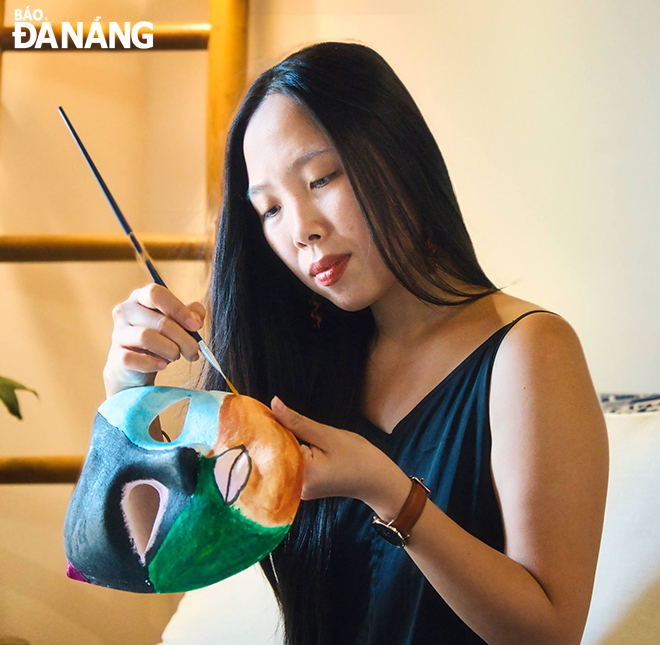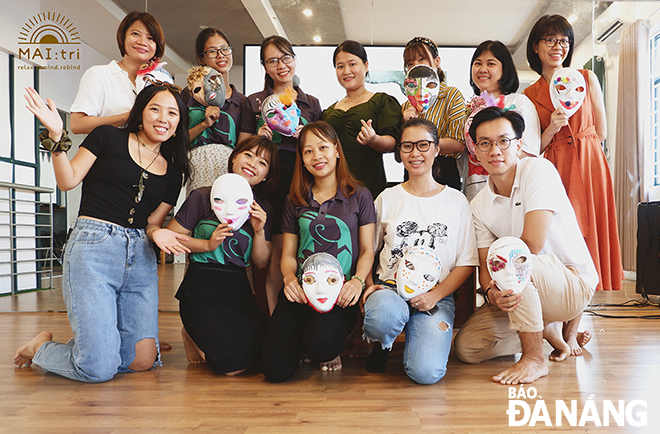Befriending emotions with art therapy
Nguyen Huong Linh, 32, is one of the rare art therapists in Viet Nam who are qualified with a formal accredited training in Art Therapy.
 |
| Art therapist Nguyen Huong Linh. (Photo provided by the character) |
She has also undergone such training courses as Mindful Compassion Training in the Naropa University, Colorado, the U.S; Sexual Development and Counseling - Psychotherapy on Sexual Diversity at Phase 1 in the Ho Chi Minh City University of Technology, Viet Nam; and One Common Unity-organised Fly By Light course on working skills with youth and community in Washington, DC.
Linh fis the founder of MAI:tri VN which is providing professional art therapy services integrated with holistic mindbodyspirit practices. She is now working in both Da Nang and Quang Nam Province’s Hoi An City, but her clients are from localities nationwide and worldwide.
Towards happiness from the inside out
After graduating with a Bachelor's degree in Architecture at the Korea National University of Arts in Seoul in 2014, Nguyen Huong Linh worked as an architect, but she felt like she was missing something to make her truly happy.
Choosing the quality of life by her own ways, Linh decided to do some freelance jobs, such as English teacher, graphic designer and author of children's books.
More than a dozen of books about children she authored herself were ordered and released by First News - Tri Viet, Kim Dong, and Women publishing houses.
Then she burst into happiness when she was introduced to a field of study, which she had been vaguely looking for, called ‘Art Therapy’.
Linh received the prestigious Fulbright scholarship in 2017 and graduated from the Master's program in Art Therapy at School of Visual Arts (New York, USA) in May 2020.
Upon returning to Viet Nam in May 2020, COVID-19 restrictions forced her to spend two weeks at a centralized quarantine facility in Ha Noi before she could enter into the community.
Rather than spend those two weeks sitting idly, Linh launched MAI:tri - an online space which provides one-on-one therapy consultation and self-reflection through art.
Her first ‘customers’ were her roommates at the facility. The positive responses she received from her roommates at the quarantine facility have motivated Linh to continue down the art therapy path.
Linh explained the reason for she choosing the name of ‘MAI:tri’ is that Maitri is one of the four virtues of Buddhism, collectively known as Brahmaviharas or ‘the immeasurables’. The term maitri can be translated from Sanskrit as "loving-kindness," "benevolence," or "friendliness." The concept is central to the Buddhist practice of loving-kindness meditation and is also referenced in ancient Hindu and Jain scriptures.
In Da Nang, in April 2021, Linh cooperated with the Salt Cancer Initiative (SCI) - a non-profit organisation - to provide psychotherapy for cancer patients. Also, she organized seminars for the LGBT community (lesbian, gay, bisexual and transgender) in the city.
Unfortunately, some of her long-term programmes in the city have been postponed due to the complicated developments of COVID-19. However, she hoped that community projects in Da Nang will resume in the next year.
Befriending anxiety
 |
| Nguyen Huong Linh (first left, front row) in an art therapy workshop in Da Nang. (Photo provided by the character) |
Although many of her crowded live events have been cancelled amid fears over COVID-19, Linh is even busier with many online sessions about how to look after mental health for social activities, projects on helping businesswomen keep emotional balance, and psychotherapy programmes for businesses which their employees suffer from work-from-home burnout.
Linh shared, at the School of Visual Arts, she received specialized training in trauma and completed 960 hours of internship under supervision in Art Therapy. After graduation, she took further intensive courses on posttraumatic stress disorder (PTSD), and mindfulness and embodiment-based treatments for posttraumatic stress disorder.
During her clinical practice, Linh noticed that trauma occurs in many ages from the elderly to children and in many situations. Especially, in the context of complicated developments of COVID-19, the traumatic grief occurs after an unexpected loss. This creates a lot of anxiety because people always want to find security and fear change.
According to Linh, the best solution to deal with the problem is to identify and accept your worries, in other words, to befriend anxiety and worries instead of confronting. Fighting or trying to ignore psychological problems doesn't work. It can be seen that although mental health has received more attention, in reality it is still not treated equally as "muscular" health. People tend to quickly go to the pharmacy or see a doctor when they feel a headache or stomachache, while the inner torments are often delayed waiting for them to subside.
Depending on the needs and the context in which psychological problems arise, there will be a corresponding solution, but basically, according to Ms. Linh, if the problem is mild, you can find yoga, meditation, qigong, and other methods of body-mind connection, or other physical activities to help release negative energy. If mental health is more serious, people can see counseling psychologists.
|
Art therapy is an integrative mental health and human services profession that enriches the lives of individuals, families, and communities through active art-making, creative process, applied psychological theory, and human experience within a psychotherapeutic relationship. Art therapy, facilitated by a professional art therapist, effectively supports personal and relational treatment goals as well as community concerns. Art therapy is used to improve cognitive and sensorimotor functions, foster self-esteem and self-awareness, cultivate emotional resilience, promote insight, enhance social skills, reduce and resolve conflicts and distress, and advance societal and ecological change. |
Reporting by THU HOA - Translating by M.DUNG